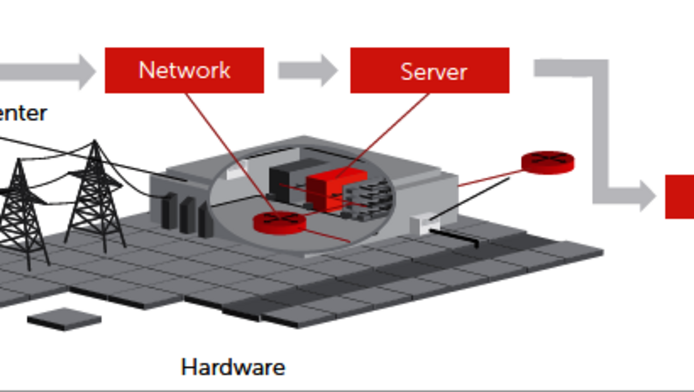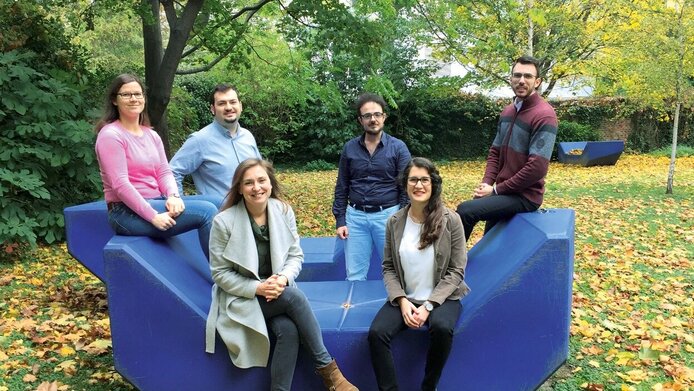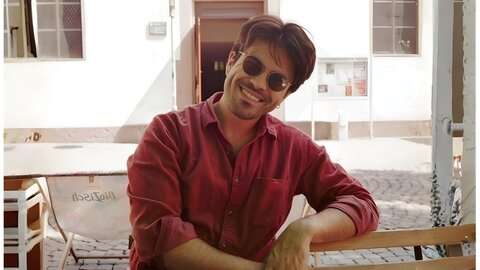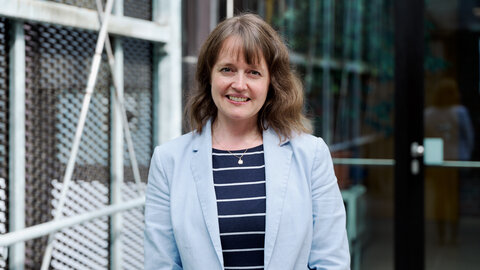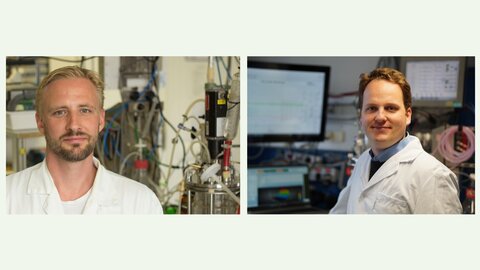“No risk, no gain”

At the age of 12, Ivona Brandić attended her first class in BASIC programming and wrote poems. At 13 she won a model-making competition – organised nationwide throughout Yugoslavia at the time. At 14 came the dramatic and traumatic rupture: she had to flee with her family from the civil war threatening her Bosnian hometown. An experience Ivona Brandić is hardly able to speak about today, 25 years later. “War and flight are traumatic, but so is the experience of suddenly being reduced to someone without language skills. Nothing else counts”, recalls Brandić, who had to repeat a school year in Mödling, where the family had found refuge, since she did not speak German. When reading media reports about refugees from Syria or other war-torn countries today, she knows just how these people feel.
The HTL – beginning of an outstanding career
In order to avoid problems linked to her poor German and English – but also to develop her talents in science and things technical – she attended the HTL (technical upper-level secondary school) in Mödling. A very good choice as it turned out, since it was the beginning of an outstanding career. The 39-year-old scientist has fond memories of her years at the HTL: “Although they gave me great support in German, they focused on the things I was good at.” In the technical subjects she excelled from the start. The tight schedule with classroom instruction running from 8 till 5 offered additional stability to the adolescent who found herself in what was then an unknown country.
Environmentally friendly computer systems
Today, Ivona Brandić is a Professor at the Institute for Software Engineering and Interactive Systems at TU Wien. Her work is about making large computing centres more energy efficient. Given the rapid pace of global digitalisation, energy consumption in information and communication technologies is an issue of growing significance. Already now the CO2 emissions caused by an IT-based lifestyle are as big as those of the aviation industry. “This discussion has not yet been taken up by the general public”, says Brandić and gives some figures: “At the moment there are about 20 billion sensors – i.e. devices that produce data such as smart phones. For 2020 the forecast speaks of 50 billion sensors.” Each of those devices produces a data stream. “In order to cope with such data volumes we have to have new forms of storing, processing and transferring data”, emphasises Brandić.
Data roaming like nomads
In order to reduce energy consumption, one requires intelligent programming technology, because the computer system needs to be able to determine and predict its own power consumption. Comparable to the human body, it has to monitor and manage itself. Another possibility for saving energy is the transfer of data to computing centres that may be located far away. When the temperatures are freezing cold in Helsinki, for instance, entire data centres could migrate there virtually, in order to economize on cooling energy. Facebook, to give another example, already has a computing centre near the Arctic Circle. Another large data centre is planned in Siberia. In 2015, Ivona Brandić received the FWF’s START Award in support of excellent young research talents for her project Rucon – Runtime Control in Multi-Clouds.
Cold data – hot data
Outsourcing data across large distances is particularly useful for so-called cold data, i.e. data that don’t have to be accessed often, such as tax returns that need to be kept for seven years. Hot data, on the other hand, need to be overwritten and updated frequently and therefore require short response times and less remote storage locations. How can applications be vetted for cold and hot data and segregated accordingly? In what cases does it make no sense at all to send data to the North Pole – or, for that matter, to the Sahara, in order to utilise renewable energy produced there by solar panels? These are some of the important questions the IT specialist focuses on. These questions also have political relevance – whenever data security and protection are concerned. Where and how are data being stored? Who is authorised to access them, and what is the state allowed to do? “We are collecting increasing amounts of data, and politicians need to provide timely answers”, Brandić insists.
Industrial revolution 4.0
There is consensus that digitalisation in the world of today is comparable to the industrial revolution – which is why it is also referred to as “industrial revolution 4.0”. “Not only will digitalisation require more and more energy, it will also profoundly change our working and social life”, the scientist predicts. The dangers she perceives in that evolution are side effects such as environmental problems, which also came to the fore at a very late stage during the industrial revolution. “At the time, no one thought about the impacts. Technologies continued to grow and suddenly there were side effects”, she says. In her opinion, digitalisation, too, will bring such long-term effects in its wake. “They'll become perceptible only in 20 or 30 years from now. We can wait until the problems arrive or start now with managing the processes in a way that resources are used optimally” says Brandić in describing the main motivation underlying her work.
New labour markets
Work processes and labour markets will also change through digitalisation: some occupations will disappear, new ones will emerge. This raises new questions. Who is able to find work and who isn’t? How can resources be distributed to make sure everyone has a livelihood? Issues such as an unconditional basic income for all would have to be raised again, as well as new forms and cycles of work. “Attending school, learning a trade and pursuing the same occupation for one’s entire life will no longer work”, notes Brandić. She also believes that we will need new institutions that provide support for people throughout their lives in order to help them cope with a frequently changing work context.
IT specialists are needed
Brandić is convinced that whatever happens there will be a need for more IT specialists in the future. “No matter whether it’s for building a car or a house – IT is everywhere.” In her view it is not possible today to predict how this particular occupational field is going to evolve. The pace of developments can be gleaned from the example of the presently much-in-demand occupation of “data scientist” – which includes a mixture of statistics and information science in order to analyse, process and interpret large amounts of data. “When I was a student that job didn't even exist. 10 years from now there will be other jobs that we don't know today.”
“One thing led to another”
Ivona Brandić has never regretted her decision to go into IT. – She's still enthusiastic about her field of science. After graduating from the HTL with a focus on communication technology she decided to study Business Informatics both at TU Wien and the University of Vienna, “in order to hear something else besides technical stuff”, she tells the interviewer from scilog. This approach is also reflected by her research, since she consistently includes economic approaches in all of her work. After her PhD she was given a six-year postdoc position at TU Wien, spent one year as a visiting researcher in Melbourne, acquired her habilitation and finally was offered a number of professorial posts. It is not a career that she planned from the outset. “One thing led to another”, she says. “I always took active decisions but never set my sights on it.” The driving force for her work throughout has been the joy of working independently.
In a minority
The women’s share among students of information science at TU Wien is 15.5 percent, the share of women graduates a little higher at 16 percent. Out of 153 professorial posts at TU Wien, 18 are occupied by women, corresponding to 11.8 percent. Ivona Brandić seems accustomed to belonging to a minority: even during her HTL years she was the only girl in the classroom. At international conferences around the globe she can rely on everyone remembering her presentation because she is one of only two women there at best. But how did she manage to have such a career? She attributes this not only to her enthusiasm for her work but also to her readiness to accept risk: “I was not scared. I just went and did it. No risk, no gain”, emphasises the information scientist with conviction. Even during her early years she was able to assess her chances well, and with every step she reflected on what she needed to do in order to get where she wanted to be. To her mind, freedom outranks security.
More risk tolerance in research funding
This is also advice she wants to pass on to her students: assess your own chances as precisely as possible and simply go ahead and do it! This would, however, also entail less risk aversion on the part of research funding bodies. “We need more financial support for young scientists who have new ideas but who constitute a certain risk”, is how Brandić defines what she would like to see.
Biological road bump
She identifies one of the reasons for the low share of women in professorial positions as being a “biological road bump” around the time of acquiring their habilitation for professorship. “Many women are reluctant to accept the uncertainties once their family planning kicks in, and so they drop out of science.” This is why she would like to see a system which enables women to reconcile having a family with a career in science – not only starting with habilitation but also earlier on during their studies. “We need not only better child-care options but also more flexible study regulations that would allow, for instance, taking a break of one year”, says Brandić.
“The START award was essential”
She herself is the mother of a two-year-old daughter and was fortunate – as she acknowledges – to have received the FWF-funded START award shortly after the birth of her daughter: “The START award was really essential at that stage, because I was able to work on something important right after my one-year break”, she recalls. Another good thing was that her mother took retirement shortly after the birth of her daughter, because "without the support from her it just wouldn't work", she adds.
Ivona Brandić is a professor at the Institute of Software Technology and Interactive Systems at TU Wien. She deals with the runtime optimization of ultra-scale systems, especially in the areas of virtualized HPC systems, energy-efficient ultra-scale systems, cloud, web & workflow quality of service (QoS) and service-oriented distributed systems. Brandić studied Business Informatics, in 2008 she was a visiting researcher at the University of Melbourne, and in 2013 she habilitated at TU Wien. In 2015, Ivona Brandić was awarded the START Prize of the Austrian Science Fund FWF for her project "Rucon - Runtime Control in Multi-Clouds".
